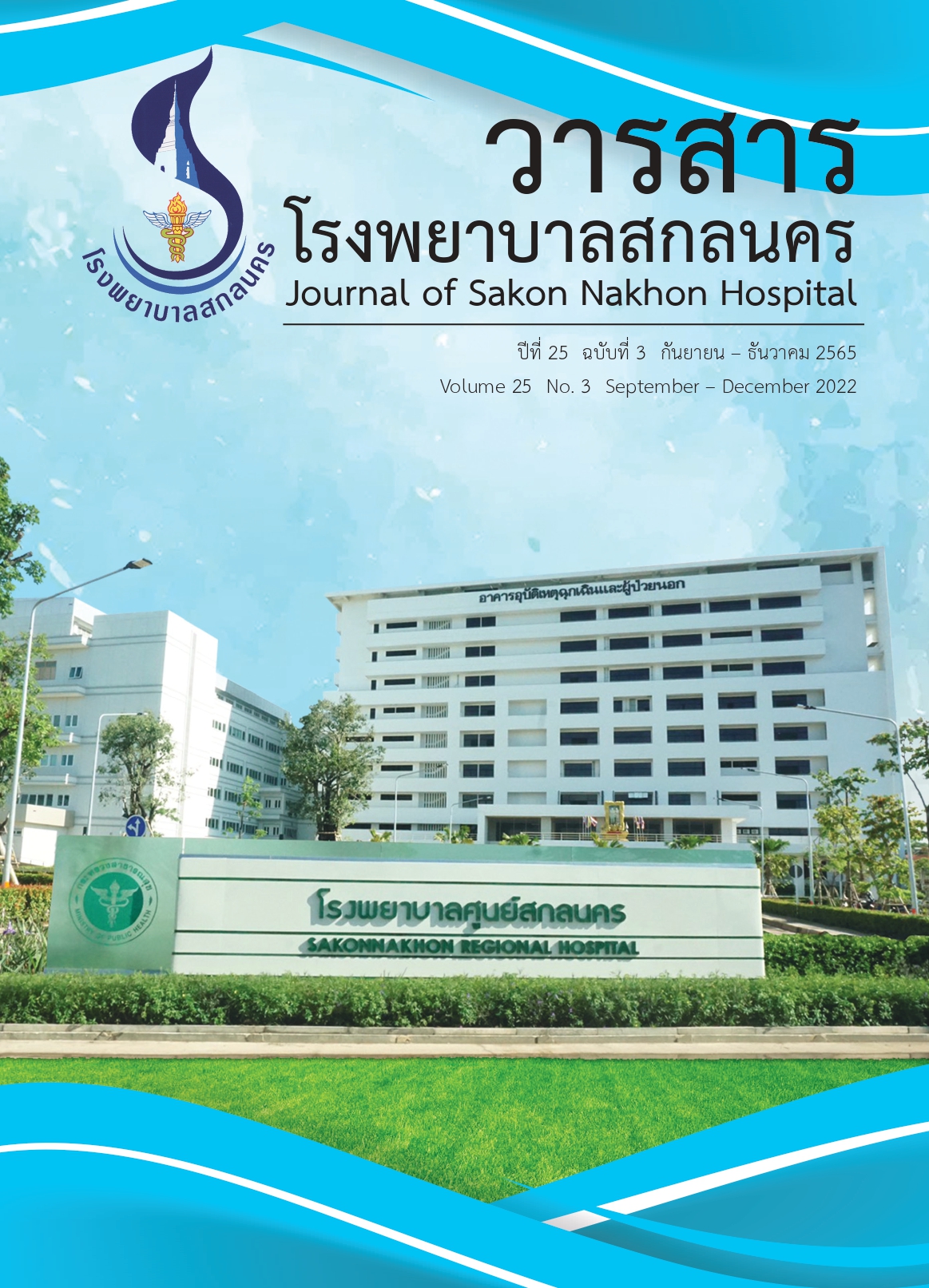Self–management Behavior of Chronic Kidney Disease Patients without Dialysis Treatment Level 1–4 in Pho, Nongkaew and Phonkhwo Sub–District, Mueng District, Sisaket Province
Keywords:
Self–management behavior, Activities of daily living, patients with stage 1–4 of chronic kidney disease without dialysis treatmentAbstract
The aim of this research was to study the level of self–management behavior and ability to perform activities of daily living in 86 patients with stage 1–4 of chronic kidney disease without dialysis treatment and to study the relationship between their personal factors, self–management behavior and ability to perform activities of daily living in Pho, Nongkaew, and Phonkhwao sub district, Mueng district, Sisaket province. The samples were purposive selected. The research tool was the questionnaire with the reliability of 0.79 calculated by Cronbach's alpha coefficient. The quantitative data were analyzed by using the descriptive statistics. The correlations were analyzed by using the Chi–square test and the Pearson product–moment correlation.
The result showed that the overall self–management behavior of the samples were at the low level with an average of 1.93 (S.D. = 0.25). Sixty–nine patients (80.2%) had the abilities to perform activities of daily living at a level of slight dependence. The correlation between their abilities to perform activities of daily living and self–management was not found. There was no correlation between their self–management behaviors and personal factors, sex, age, marriage status, educational level, occupation, income, patient right and stage of the disease. The findings suggested that patients’ self–ability to perform activities of daily living should be encouraged in order to improve their self–managements and to apply to perform in daily living effectively.
References
กระทรวงสาธารณสุข. คู่มือปฏิบัติการเพื่อดำเนินงานลดโรคไตเรื้อรัง (CKD) ในผู้ป่วยเบาหวานและความดันโลหิตสูง. กรุงทพฯ: สำนักงานกิจการโรงพิมพ์ องค์กรสงเคราะห์ทหารผ่านศึก ในพระบรมราชูปถัมภ์; 2559.
ประเสริฐ ธนกิจจารุ. สถานการณ์ปัจจุบันของโรคไตเรื้อรังในประเทศไทย. ว. กรมการแพทย์ 2558;5(5):5–18.
Nephrology Society of Thailand. Guidelines for kidney diseases. Bangkok: BNS Advance; 2016. (in Thai).
Hamler TC , Miller VJ, Petrakovitz S. Chronic kidney disease and older African American adults: How embodiment influences self–management. Geriatrics 2018;3(3):52.
สุนิสา สีผม. การจัดการตนเองในผู้ป่วยโรคไตเรื้อรัง. ว. สภากาชาดไทย 2556;6(1):12–17.
จินตนา กิ่งแก้ว. ภาวะทุพโภชนาการและบทบาทพยาบาลในการส่งเสริมโภชนาการของผู้ป่วยซีเอพีดี. ว. โรงพยาบาลสกลนคร 2559;19(1):220–228.
Edemekong PF, Bomgaars DL, Sukumaran S, Levy SB. Activities of Daily Living. Stat Pearls. Treasure Island (FL): StatPearls Publishing ; 2021.
ชนัตถา พลอยเลื่อมแสง, และคณะ. ปัญหาการใช้ยาและปัจจัยที่มีผลต่อปัญหาการใช้ยาในผู้สูงอายุชุมชนบ้านมะกอก อำเภอกันทรวิชัย จังหวัดมหาสารคาม. ว. วิทยาศาสตร์และเทคโนโลยีมหาวิทยาลัยมหาสารคาม 2555;ฉบับพิเศษ:803–812.
นิทรา กิจธีระวุฒิวงษ์. การวิจัยทางสาธารณสุข: จากหลักการสู่การปฏิบัติ. พิมพ์ครั้งที่ 2. พิษณุโลก: สำนักพิมพ์มหาวิทยาลัยนเรศวร; 2561.
Mahoney FL, Barthel DW. Functional evaluation: The Barthel Index. Maryland state medical Journal 1965;14(1):56–61.
สำนักการแพทย์ กรุงเทพมหานคร. แนวทางการให้บริการผู้สูงอายุในพื้นที่กรุงเทพมหานคร. กรุงเทพฯ: สำนักการแพทย์ กรุงเทพมหานคร; 2562.
วิภาวรรณ อะสงค์. ปัจจัยที่มีอิทธิพลต่อพฤติกรรมการบริโภคอาหารและน้ำของผู้ป่วยโรคไตเรื้อรัง [วิทยานิพนธ์]. ชลบุรี: บัณฑิตวิทยาลัย มหาวิทยาลัยบูรพา; 2558.
Best JW. Research in education. Englewood Cilifts. New Jersy: Printice–Hall; 1970.
ศิริวรรณ พายพัตรและคณะ. ความสัมพันธ์ระหว่างความรู้และการรับรู้สมรรถนะแห่งตนกับพฤติกรรมการจัดการตนเองในผู้ป่วยโรคไตเรื้อรัง. ว. การพยาบาลและสุขภาพ สสอท 2564;3(2):22–36.
จิรังกูร ณัฐรังสี, สุนิตา ไชยมี, สุวนันท์ จังจิตร, สุภาวินี สุภะพินิ, สุปรียา โพธิ์อุดม. ความสามารถในการประกอบกิจวัตรประจำวันและความสุขของผู้สูงอายุชุมชนทุ่งขนุนน้อยอุบลราชธานี. ว. ราชธานี นวัตกรรมทางวิทยาศาสตร์สุขภาพ 2561;2(1):50–60.
Downloads
Published
How to Cite
Issue
Section
License
บทความที่ตีพิมพ์ถือว่าเป็นลิขสิทธิ์ของวารสารโรงพยาบาลสกลนคร การคัดลอกเพื่อพัฒนาเชิงวิชาการต้องได้รับการอ้างอิงอย่างถูกต้อง






